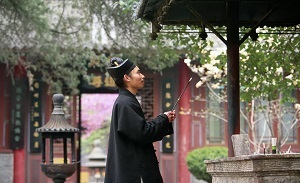Wu Wei: The Taoist Principle of Action in Non-Action

One of Taoism’s most important concepts is wu wei, which is sometimes translated as “non-doing” or “non-action.” A better way to think of it, however, is as a paradoxical “Action of non-action.” Wu wei refers to the cultivation of a state of being in which our actions are quite effortlessly in alignment with the ebb and flow of the elemental cycles of the natural world. It is a kind of “going with the flow” that is characterized by great ease and awareness, in which—without even trying—we’re able to respond perfectly to whatever situations arise.
The Taoist principle of wu wei has similarities to the goal in Buddhism of non-clinging to the idea of an individual ego. A Buddhist who relinquishes ego in favor of acting through the influence of inherent Buddha-nature is behaving in a very Taoist manner.
The Choice to Relate to or Withdraw From Society
Historically, wu wei has been practiced both within and outside of existing social and political structures. In the Daode Jing, Laozi introduces us to his ideal of the “enlightened leader” who, by embodying the principles of wu wei, is able to rule in a way that creates happiness and prosperity for all of a country’s inhabitants. Wu wei has also found expression in the choice made by some Taoist adepts to withdraw from society in order to live the life of a hermit, wandering freely through mountain meadows, meditating for long stretches in caves, and being nourished in a very direct way by the energy of the natural world.
The Highest Form of Virtue
The practice of wu wei is the expression of what in Taoism is considered to be the highest form of virtue—one that is in no way premeditated but instead arises spontaneously. In verse 38 of the Daode Jing (translated here by Jonathan Star), Laozi tells us:
The highest virtue is to act without a sense of self
The highest kindness is to give without a condition
The highest justice is to see without a preference
When Tao is lost one must learn the rules of virtue
When virtue is lost, the rules of kindness
When kindness is lost, the rules of justice
When justice is lost, the rules of conduct
As we find our alignment with the Tao—with the rhythms of the elements within and outside of our bodies—our actions are quite naturally of the highest benefit to all who we contact. At this point, we have gone beyond the need for formal religious or secular moral precepts of any sort. We have become the embodiment of wu wei, the "Action of non-action"; as well as of wu nien, the "Thought of non-thought," and wu hsin, the "Mind of non-mind." We have realized our place within the web of inter-being, within the cosmos, and, knowing our connection to all-that-is, can offer only thoughts, words, and actions that do no harm and that are spontaneously virtuous.
By Elizabeth Reninger
https://www.learnreligions.com/

